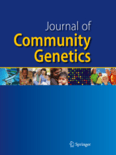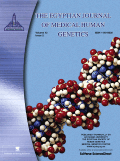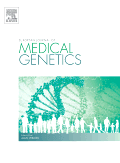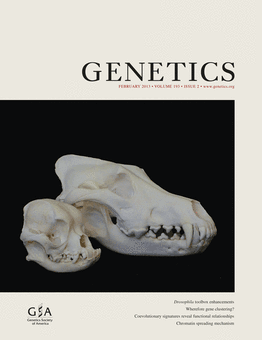
Journal of Community Genetics
Scope & Guideline
Transforming genetic research for community well-being.
Introduction
Aims and Scopes
- Community Engagement in Genetics:
The journal promotes the integration of community perspectives in genetic research and counseling, highlighting the importance of culturally sensitive approaches to genetic education and services. - Research on Genetic Disorders:
A core focus is on the study of genetic disorders, particularly their prevalence, impact, and management in various populations, including underrepresented and marginalized communities. - Education and Training:
The journal emphasizes the need for effective education and training of healthcare providers in genetics, ensuring they are equipped to communicate genetic information and manage patient care effectively. - Ethical, Legal, and Social Implications (ELSI):
The journal addresses the ethical, legal, and social implications of genetic research and testing, discussing issues such as consent, privacy, and the impact of genetic information on individuals and families. - Policy Development for Genetic Services:
There is a consistent focus on the development and implementation of policies that improve access to genetic testing and counseling, particularly in low- and middle-income countries.
Trending and Emerging
- Telehealth and Digital Interventions:
The rise of telehealth services and digital interventions in genetic counseling is increasingly prominent, driven by the COVID-19 pandemic and the need for accessible healthcare solutions. - Patient-Centered Approaches:
There is a growing emphasis on understanding patient perspectives and experiences, particularly regarding genetic testing and counseling, to enhance service delivery and support. - Diversity and Inclusion in Genetic Research:
Emerging themes highlight the importance of including diverse populations in genetic research to address health disparities and improve outcomes across different demographic groups. - Ethics of Genetic Technologies:
As genetic technologies evolve, there is an increasing focus on the ethical implications of new genetic interventions, including gene editing and genetic testing in vulnerable populations. - Integration of Genomics in Public Health:
The integration of genomic data into public health initiatives is gaining traction, reflecting a trend towards using genetics to inform community health strategies and policy-making.
Declining or Waning
- Traditional Genetic Counseling Models:
As the field evolves towards more integrated and technology-driven approaches, traditional models of genetic counseling that do not incorporate digital tools or community engagement are seeing less emphasis. - Focus on Rare Genetic Disorders:
Although still important, there seems to be a gradual decline in publications specifically centered on rare genetic disorders, as the journal increasingly addresses broader public health implications of genetics. - Genetic Testing Accessibility Issues:
The discussion around barriers to genetic testing access has decreased, possibly as more studies focus on actionable insights and solutions rather than merely identifying these barriers. - Basic Genetic Education:
The content related to basic genetic education for the general public appears to be diminishing, with a shift towards more specialized training and advanced genetic concepts. - Single-Country Studies:
There is a noticeable decrease in studies focusing solely on genetic issues within a single country, as the journal increasingly emphasizes comparative and global perspectives.
Similar Journals

PSYCHIATRIC GENETICS
Connecting Genetics with Psychiatry: Pioneering New FrontiersPSYCHIATRIC GENETICS, published by LIPPINCOTT WILLIAMS & WILKINS, is a pivotal journal dedicated to the interdisciplinary study of genetic factors in psychiatric disorders, bridging the fields of genetics, psychiatry, and neuroscience. With a commitment to advancing research from its inception in 1990 and continuing through 2024, the journal provides a platform for innovative studies and findings that explore the genetic underpinnings of mental health. Although not currently an Open Access publication, it reaches a wide audience concerned with the complex interplay between genetics and psychiatric conditions, contributing to its Q3 and Q2 quartile rankings across multiple relevant categories in 2023. The importance of this journal cannot be understated; it serves as a crucial resource for researchers, clinicians, and students eager to uncover insights that could lead to more effective interventions and treatments in the realm of mental health.

JOURNAL OF MEDICAL GENETICS
Unlocking the Secrets of Genetics for Clinical Innovation.JOURNAL OF MEDICAL GENETICS, published by the BMJ PUBLISHING GROUP, stands as a premier platform in the field of genetics, focusing on both fundamental genetic research and its clinical applications. With a distinctive legacy dating back to 1965 and a significant role in advancing the understanding of genetic disorders, this journal has established itself in the top tiers with a commendable Q1 category ranking in both Genetics and Clinical Genetics as of 2023. The journal's impact is underscored by its Scopus rankings, placing it among the leading journals in the fields of medicine and genetics. Researchers and practitioners are drawn to its rigorous peer-review process and its commitment to disseminating high-quality research findings, critical reviews, and innovative clinical practices. While it is not an open-access journal, the insights provided are invaluable for anyone looking to deepen their knowledge or contribute to the burgeoning field of medical genetics.

Egyptian Journal of Medical Human Genetics
Unlocking the genetic code for human health insights.The Egyptian Journal of Medical Human Genetics is a distinguished Open Access journal published by SPRINGER NATURE, dedicated to advancing the field of medical human genetics. With an ISSN of 1110-8630 and an E-ISSN of 2090-2441, this journal serves as a vital platform for researchers, professionals, and students who are committed to the exploration of genetic implications on human health. Since its inception in 2010, it has become a growing repository of knowledge, significantly contributing to the discourse in clinical genetics, despite currently being ranked in the Q4 quartile of its category in 2023. The journal embraces an open access model, ensuring widespread visibility and accessibility of published research, thereby fostering collaboration and innovation in the field. The journal is not only aimed at disseminating findings but also at encouraging the dialogue around genetic research developments, making it an essential resource for anyone interested in the nuances of genetics and its impact on medicine.

European Journal of Medical Genetics
Unlocking Genetic Secrets for Better Health OutcomesEuropean Journal of Medical Genetics, published by Elsevier, is a pivotal platform dedicated to advancing knowledge in the fields of medical genetics and its clinical applications. With an ISSN of 1769-7212 and an E-ISSN of 1878-0849, this journal fosters innovative research and insights into the genetic factors that influence human health. Ranked in the Q3 category for both Genetics and Clinical Genetics, and achieving notable recognition in Medicine (miscellaneous) with a Q2 positioning, it strives to bridge the gap between laboratory findings and clinical practice. Operating in an Open Access format, the journal aims at maximally disseminating essential findings to researchers, professionals, and students alike, ensuring that critical advances in genetics are accessible to the global medical community. With converged publication years spanning from 2005 to 2024, the journal strengthens its mission to be at the forefront of genetic research that informs clinical methodologies and fosters improved healthcare outcomes.

HUMAN GENETICS
Driving innovation in clinical genetics.HUMAN GENETICS, published by SPRINGER, stands as a cornerstone journal in the field of genetics, offering a wealth of research insights since its inception in 1964. Hailing from Germany, this esteemed journal boasts an impressive Q1 ranking in both Genetics and Clinical Genetics, marking it among the top quartile of journals in these categories for 2023. With a notable Scopus rank of #7 in Clinical Genetics and a percentile ranking of 93, HUMAN GENETICS attracts significant attention from researchers and professionals dedicated to advancing our understanding of genetic influences on human health and disease. Although it does not currently offer Open Access options, the journal provides a critical platform for scholarly communication, aimed at disseminating groundbreaking findings in genetics and biotechnology. As the field evolves, HUMAN GENETICS continues to play an instrumental role in bridging the gap between laboratory research and clinical application, making it an essential resource for students and seasoned researchers alike.

Familial Cancer
Unraveling the complexities of familial cancer.Familial Cancer is a premier journal dedicated to advancing the understanding of hereditary cancer, published by Springer. With an ISSN of 1389-9600 and E-ISSN 1573-7292, this journal serves as an essential platform for researchers and clinicians focused on the genetic predispositions to cancer and the implications for patient care. Since its inception in 2001, Familial Cancer has built a strong reputation, being consistently ranked in the Q2 category across several key research areas including Cancer Research, Genetics, and Oncology. As of 2023, it holds significant Scopus rankings, reflecting its impactful contributions in the fields of Medicine and Genetics, with a focus on clinical applications. The journal does not currently offer Open Access, emphasizing the commitment to rigorous peer review and high-quality publications. It is vital for emerging researchers and seasoned professionals alike, providing insights into the hereditary aspects of cancer and fostering developments that can lead to better prevention and therapeutic strategies.

GENETICS
Championing Excellence in Genetic ScholarshipGENETICS, published by the Genetics Society of America, stands as a preeminent journal in the field of genetics, with a keen focus on advancing the understanding of genetic principles and their implications across various biological systems. Since its inception in 1945, the journal has played a pivotal role in disseminating groundbreaking research, maintaining a Q1 ranking in the genetics category as of 2023, positioning it among the top tier of academic publications. While access to the journal is not open, it continues to attract a global readership of researchers, professionals, and students eager to engage with high-quality, peer-reviewed articles that span both classical and contemporary genetics. With its publication history covering critical decades from 1945 to 2024, GENETICS is not just a repository of scientific knowledge but a vibrant forum for the exchange of ideas that drive the field forward. The journal’s commitment to excellence is demonstrated by its strategic coverage of pertinent topics, assuring its relevance for future generations of scholars.

NEW GENETICS AND SOCIETY
Advancing Understanding of Genetic Technologies and Their ImpactNEW GENETICS AND SOCIETY is a pioneering peer-reviewed journal published by Routledge Journals, Taylor & Francis Ltd, specializing in the interdisciplinary fields of genetics, health policy, and social science. Since its inception, the journal has provided a critical platform for the exploration of genetic technologies and their societal implications. With an Open Access model adopted in 2022, it continues to enhance accessibility, fostering a global dialogue among researchers, professionals, and students dedicated to understanding the complex interplay between genetics and society. The journal holds a commendable ranking in various categories, including Q2 in Health (social science) and Issues, Ethics and Legal Aspects, reflecting its substantial contribution to these fields. As the discourse around genetics evolves, NEW GENETICS AND SOCIETY remains at the forefront, addressing pressing ethical, legal, and social questions that shape contemporary health policies and practice.

EUROPEAN JOURNAL OF HUMAN GENETICS
Advancing the Frontiers of Human GeneticsThe EUROPEAN JOURNAL OF HUMAN GENETICS, published by SpringerNature, stands as a preeminent platform in the field of genetics and clinical genetics. Established in 1993, this prestigious journal, with an ISSN of 1018-4813 and an E-ISSN of 1476-5438, has consistently maintained its position in the Q1 quartile for both Genetics and Clinical Genetics categories as of 2023, reflecting its significant contributions to the field. Its impact is further underscored by its impressive Scopus rankings, placing it in the 92nd percentile among clinical genetics journals. The journal aims to disseminate cutting-edge research, case studies, and reviews that advance our understanding of human genetics, promoting collaboration and innovation among researchers, professionals, and students alike. While it does not currently offer open access, the journal provides substantial value through its rigorous peer review process and commitment to quality. As it continues to shape the future of genetic research through 2024 and beyond, the EUROPEAN JOURNAL OF HUMAN GENETICS remains an essential resource for those dedicated to exploring the complexities of human heredity.

Gene Reports is a prominent academic journal published by Elsevier that focuses on the rapidly evolving field of genetics. Launched in 2015, this journal serves as a pivotal platform for the dissemination of cutting-edge research, bridging the gap between basic and applied genetics studies. Although it currently holds a Q4 ranking in the Genetics category and stands at the 248th position out of 347 in Scopus rankings, its potential for growth is significant given the increasing interest in genetic research across various disciplines. With an E-ISSN of 2452-0144, Gene Reports aims to provide open access to original research articles, reviews, and short communications that advance the collective understanding of genetic mechanisms and their applications. As a publication that continues to shape the future of genetics, it is an essential resource for researchers, professionals, and students seeking to stay informed about the latest developments in this crucial field.